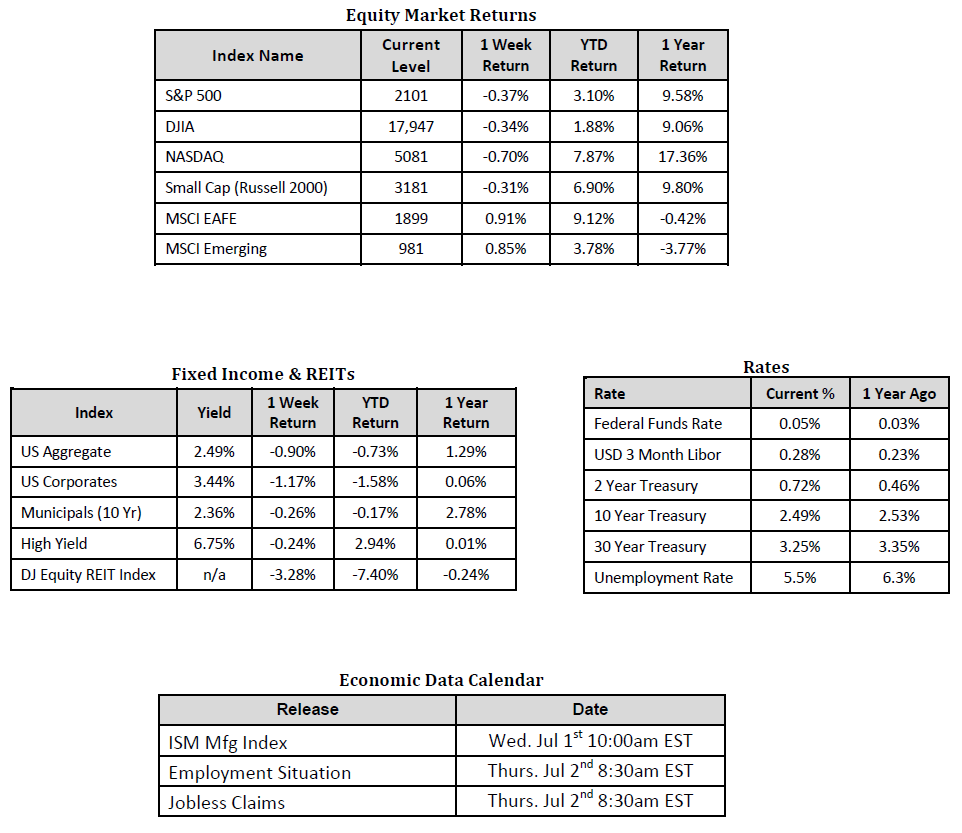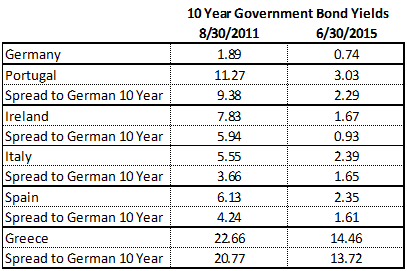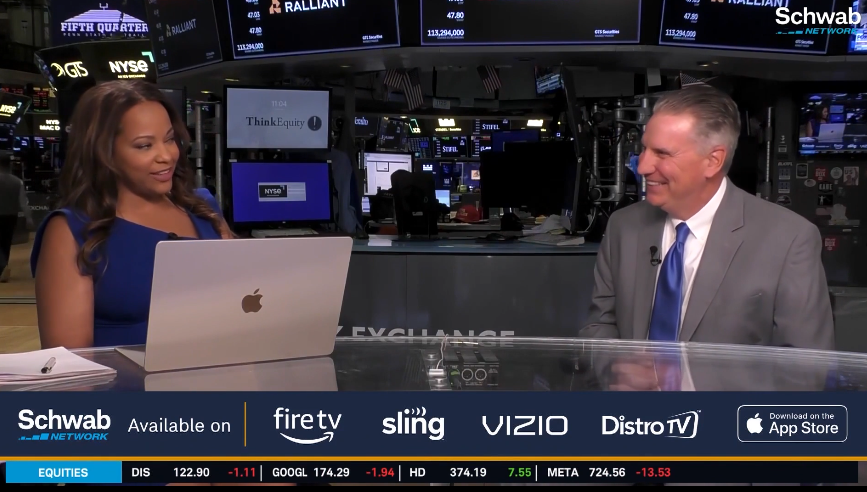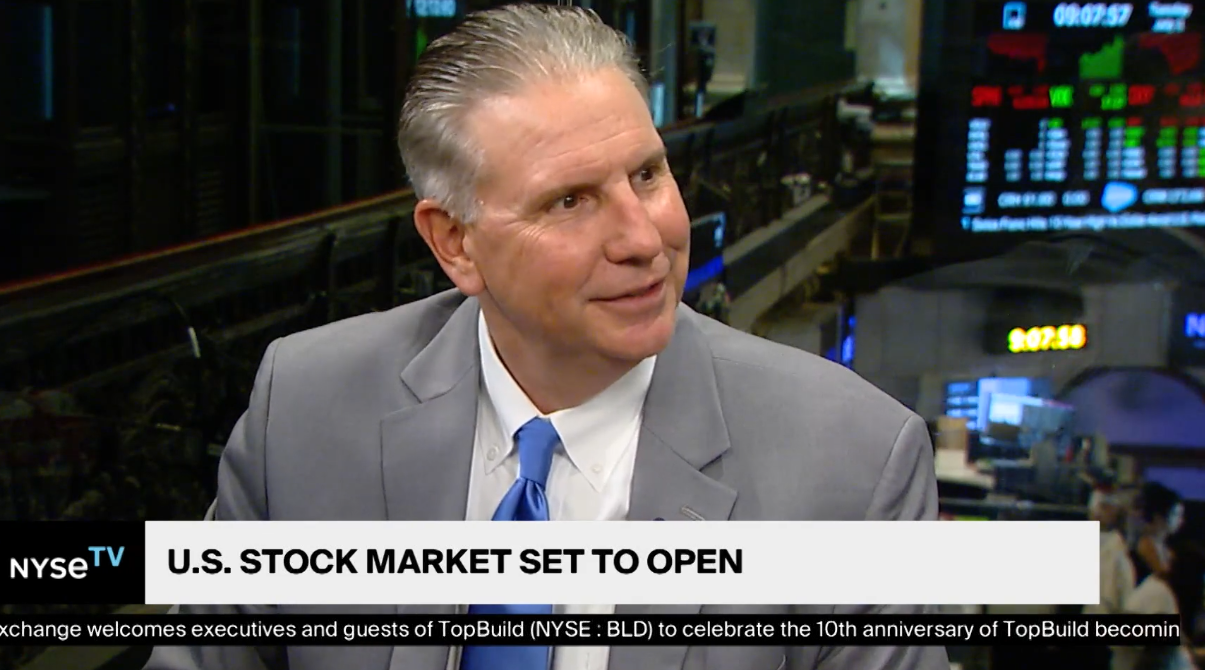
Greece Pains Help to Highlight Overall Eurozone Strength
Market Overview
Happening Now
Greece, of course, has been the dominant story this week as negotiations have broken down, banks closed, and capital controls put in place. Images of rallies, protestors and empty ATMs have brought the realities and implications of a potential Greek default to the forefront of investors’ minds worldwide. The immediate aftermath seen in Monday’s trading was a relatively steep and broad based decline in stock prices and a flight to U.S. and German government debt. While the sell-off on Monday in developed international stocks was the sharpest in recent memory, the current back drop of improving economic conditions, monetary easing and a more stable financial system overall has kept markets relatively stable when compared to the European Debt Crises of 2011.
As a measurement of market stability we look to the volatility indexes associated with U.S. (VIX) and Developed International stocks (VXEFA) as well as the yields of euro-zone government debt. In terms of stock market volatility, as of the close of business yesterday* the VXEFA (MSCI EAFE Volatility Index) was 17.61, or 43% lower than its August 2011 level of 30.71. Domestically, the VIX (S&P 500 Volatility Index) closed yesterday with a reading of 17.48, or 59% lower than the 42.15 reading also registered at the end of August 2011. Perhaps a better measuring stick of sovereign risk is the spread between 10 Year German Government Debt and that of the other member countries, which is provided below:
Clearly, yields on an absolute basis are lower, reflecting the better economic conditions and monetary policy referenced above. The key point here, however, is that spreads overall have fallen and are reflecting less fear over the credit worthiness of the often vilified PIIGS countries.
This increase in stock market volatility may very well have presented some investors with buying opportunities in asset classes that are absent or underweight in their portfolios.
*Monday 6/29/2015
Sources: Equity Market, Fixed Income and REIT returns from JP Morgan as of 6/26/15. Rates and Economic Calendar Data from Bloomberg as of 6/29/15.
Important Information and Disclaimers
Disclosures: Past performance does not guarantee future results. We have taken this information from sources that we believe to be reliable and accurate. Hennion and Walsh cannot guarantee the accuracy of said information and cannot be held liable.
Investing in foreign securities presents certain risks not associated with domestic investments, such as currency fluctuation, political and economic instability, and different accounting standards. This may result in greater share price volatility. These risks are heightened in emerging markets.
There are special risks associated with an investment in real estate, including credit risk, interest rate fluctuations and the impact of varied economic conditions. Distributions from REIT investments are taxed at the owner’s tax bracket.
The prices of small company and mid cap stocks are generally more volatile than large company stocks. They often involve higher risks because smaller companies may lack the management expertise, financial resources, product diversification and competitive strengths to endure adverse economic conditions.
Investing in commodities is not suitable for all investors. Exposure to the commodities markets may subject an investment to greater share price volatility than an investment in traditional equity or debt securities. Investments in commodities may be affected by changes in overall market movements, commodity index volatility, changes in interest rates or factors affecting a particular industry or commodity.
Products that invest in commodities may employ more complex strategies which may expose investors to additional risks.
Investing in fixed income securities involves certain risks such as market risk if sold prior to maturity and credit risk especially if investing in high yield bonds, which have lower ratings and are subject to greater volatility. All fixed income investments may be worth less than original cost upon redemption or maturity. Bond Prices fluctuate inversely to changes in interest rates. Therefore, a general rise in interest rates can result in the decline of the value of your investment.
Definitions
MSCI- EAFE: The Morgan Stanley Capital International Europe, Australasia and Far East Index, a free float-adjusted market capitalization index that is designed to measure developed-market equity performance, excluding the United States and Canada.
MSCI-Emerging Markets: The Morgan Stanley Capital International Emerging Market Index, is a free float-adjusted market capitalization index that is designed to measure the performance of global emerging markets of about 25 emerging economies.
Russell 3000: The Russell 3000 measures the performance of the 3000 largest US companies based on total market capitalization and represents about 98% of the investible US Equity market.
ML BOFA US Corp Mstr [Merill Lynch US Corporate Master]: The Merrill Lynch Corporate Master Market Index is a statistical composite tracking the performance of the entire US corporate bond market over time.
ML Muni Master [Merill Lynch US Corporate Master]: The Merrill Lynch Municipal Bond Master Index is a broad measure of the municipal fixed income market.
Investors cannot directly purchase any index.
LIBOR, London Interbank Offered Rate, is the rate of interest at which banks offer to lend money to one another in the wholesale money markets in London.
The Dow Jones Industrial Average is an unweighted index of 30 “blue-chip” industrial U.S. stocks.
The S&P Midcap 400 Index is a capitalization-weighted index measuring the performance of the mid-range sector of the U.S. stock market, and represents approximately 7% of the total market value of U.S. equities. Companies in the Index fall between S&P 500 Index and the S&P SmallCap 600 Index in size: between $1-4 billion.
DJ Equity REIT Index represents all publicly traded real estate investment trusts in the Dow Jones U.S. stock universe classified as Equity REITs according to the S&P Dow Jones Indices REIT Industry Classification Hierarchy. These companies are REITSs that primarily own and operate income-producing real estate





